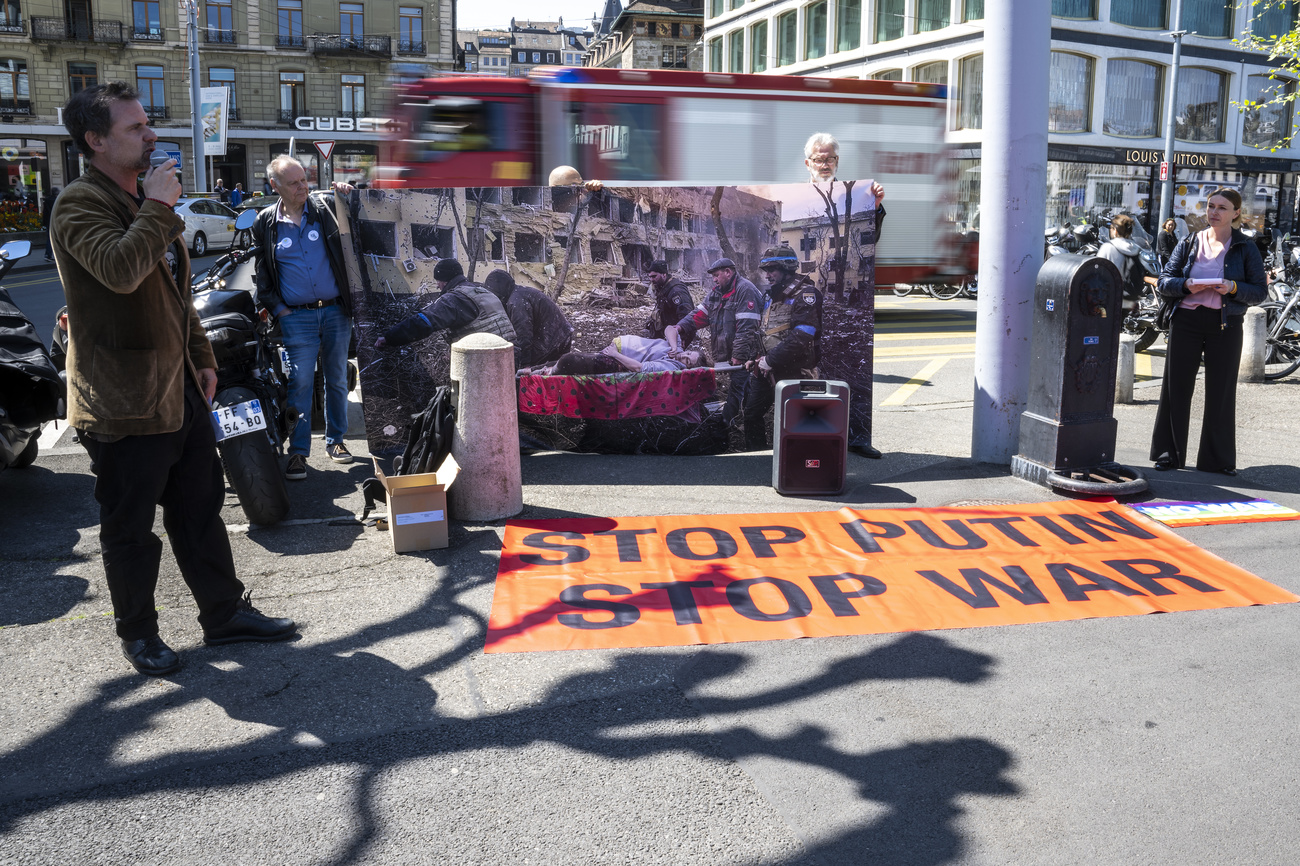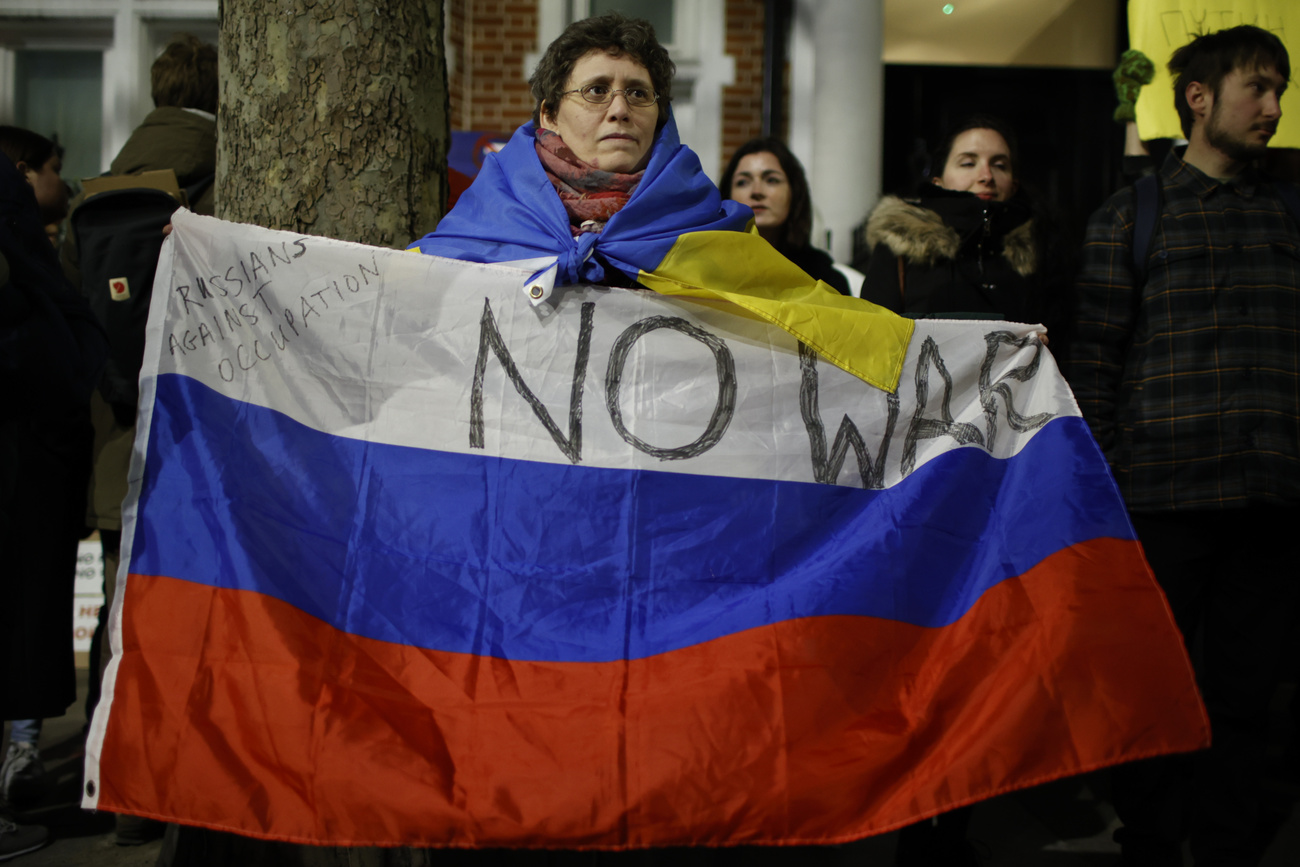How Russian sanctions are permeating Switzerland’s luxury sanctum

After Western countries mounted sanctions against Russian assets abroad in response to the war in Ukraine, a cat-and-mouse game regarding that wealth started in Switzerland between regulators and oligarchs. The luxury sector is feeling the chill.
“You just can’t reach them by phone these days,” an investigator working on international asset recovery told SWI swissinfo.ch about Swiss financial advisers working with targeted Russian clients. “They are working round the clock”.
Since the Russian invasion of Ukraine on February 24, Switzerland has aligned itself with European economic measures, including the freezing of assetsExternal link owned by the Russian state and oligarchs who had benefitted from relations to president Vladimir Putin, and by prohibiting financial transactions in businesses linked to the vital Russian energy sector and commodity trading with Russia.
Swiss investigators seeking assets liable to be frozen certainly have their work cut out for them. As multiple media investigations into offshore wealth have demonstrated over the years, wealthy individuals, not just Russian oligarchs, have long employed complex legal structures to transfer assets in companies whose ownership has often been referred to as Russian stacking dolls: one legal entity being owned by another and so-forth.
“Reports on the assets of sanctioned persons are constantly coming in at SECO,” Florian Maienfisch, a spokesperson from the State Secretariat for Economic Affairs (SECO), which runs the government’s oligarch taskforce. “Since this process is still in full swing, reports that have already been received only represent an incomplete, changing intermediate status.”
The office explained that in addition to banks, local and cantonal authorities as well as insurance companies, individuals, civic society groups or anyone who may suspect ownership of properties and assets by sanctioned persons in Switzerland may alert the taskforce of such links. Lawyers working in other capacities than to defend a client in court – including as a fiduciary – are “obligated” to report any sanctionable assets.
An example of the challenges Swiss regulators are facing getting their hands on Russian assets in the country, include those of the Rotenberg brothers. According to a report in Swiss weekly, Le Matin DimancheExternal link, Arkady Rotenberg and his brother and Boris, whom British prime minister called “cronies” of the Russian president, had employed structures set up by a Geneva bank to obscure the ultimate holder of funds. The brothers had been forced to sell their private jets after Swiss bank Credit Suisse terminated leases, as revealed by the Financial TimesExternal link.
Wealth out of sight
While estimates have varied widely, the value of Russian assets in Switzerland has ranged from a conservative estimates by the Swiss National Bank of some $25 billionExternal link (CHF24 billion) 2021 for fiduciary and customer deposits, to up to CHF200 billionExternal link ($209 billion) according to the Swiss Bankers Association. The government announced last month that CHF6.3 billion in funds had been frozen, down from CHF7.5 billion after some funds were released due to “insufficient grounds”External link for holding them. According to official data, roughly 16,500 Russian nationals currently reside in Switzerland. The Russian embassy in Bern said that as this does not include individuals with dual Swiss citizenship, saying the number may actually be nearly double that.
Some assets are easier to track than others. More than 1,000External link Russian individuals are currently on Switzerland’s sanctions listExternal link, including a fistfulExternal link of residents in Switzerland, who are said to have benefitted from authorisations linked to their wealth, involving tax deals. One such oligarch is Petr Aven, said to be a Putin confident, whose Bernese holiday home was seized in March.
Over the years, Geneva has become home to a number of politically-exposed persons (PEPs), who have purchased multi-million franc properties, often sparking questions regarding the origin of such funds. In addition to Aven, other properties tied to Russians targeted with sanctions in Bern, Geneva and other cantons have been seized by authorities, as local property registrars scan the sanctions list.
Can do better
Since the introduction of sanctions, the concern though is that similarly to liquidity, other more tangible assets such as art may be difficult to track. While KYC (Know Your Client) requirements have been introduced in different sectors, the implementation has been variable.
For Mark Pieth, a Swiss-based anti-corruption expert, Switzerland’s record overall to confiscate Russian assets has been spotty. “Switzerland did not follow EU sanctions after the Crimean annexation, therefore it was considered by many Russians as a safe haven,” he tells SWI.
He said one of the issues in Switzerland was a failure to subject financial advisors to anti-money laundering (AML) legislation. He added the Financial Action Task Force (FATF), an intergovernmental organisation that assesses countries’ performances on combatting money-laundering, should “certainly discuss this matter” during its next evaluation of the Alpine country.
A €100,000 (CHF103,000) limit on cash transfers by Russian nationals, imposed by the European Union and replicated by Switzerland, still allows business transactions up to that amount to be made, retailers told SWI.
Art has certainly been one of the sectors where oligarchs have been able to benefit from loopholes.
There is concern among global experts that the sector may continue to benefitExternal link from the lack of regulation, including through the use of non-fungible tokens (NFTs). US and British authorities have shared these concerns since the start of the war.
Recently, Geneva’s secretive freeports, where precious assets may be held duty-free, have been the focus of inspections by Swiss customs officials. But regulations of the locales mean that inspectors may themselves find it impossibleExternal link to know which items to look for.
While freeports are subject to Swiss law, meaning that they have the duty to maintain inventories, ultimately they do not ask for the names of the beneficiary owners, often hidden behind a web of lawyers and companies.
But ultimately the decision of which assets should be frozen is left with the authorities. “When we suspect that there is an asset that should have been frozen and was not frozen, we will investigate,” Michael Wuethrich, also from SECO, told SWI.
Toxic business
Nonetheless, as sanctions against the oligarchs endure, a Geneva fiduciary expert admitted that those who are targeted are feeling the chill as they scramble for advice on how to manage their many assets.
Financial advisors are increasingly wary, he said, of maintaining relations with Russian clients who are seen as “toxic”.
“They are toxic not just for banks but also for people like us,” he said. The advisor shared that a certain client and a key target on the sanctions list who had a known residence in a Geneva suburb had resorted to consulting various consultants on specific issues, “making it impossible for any of them to have a global view of his financial situation”.
SWI reached out to several other Russians for comment about their situation, but they did not respond.
Grounded jets
In Russian luxury hotspots such as Geneva, the effect of sanctions is certainly being felt.
In the real estate market for instance, wealthy Russian clients have become expectedly more sparse. One Geneva independent luxury real-estate agent told SWI a Russian client decided to delay for now the purchase of a “large property”. She said the buyers were aware that “newspapers report when there is an important sale in Geneva, and they don’t want people to speak about them”.
The agent did not reveal the name of the Russian buyer.
Early April, Russian speakers were nowhere to be heard entering a watch fair held in Geneva – the first to take place live in three years due to the pandemic. Organisers of the Watches and Wonders event made little mention of the war’s impact on the industry, which has otherwise performed robustly throughout the pandemic.
Similar to art, “panic buyingExternal link” of tradeable luxury items as watches or jewellery was reported. But on a recent afternoon, employees at one of the many empty watch shops in central Geneva told SWI that “of course” sanctions were having a downward impact on their clientele. Brand headquarters contacted for this article refused to comment publicly.
Robert Grauwiller, president of the Swiss watch and jewellery retailers’ association, said that following the imposition of sanctions specific to their trade, “no one will want to violate those rules”. He said the group does not collect customer data on its sales, but added that shops specialising in high end sales are “a very closed network with regard to clients”.
Elsewhere in the Swiss luxury market, the absence of wealthy Russians has also been noticed.
An expert in aircraft services in Geneva who asked not to be identified told SWI the situations has been “complicated,” when asked about what the removal of Russian business has meant for the company.
Geneva, which had been a regular destination for private jet traffic from Russia, has seen a halt in those flights in recent weeks. As the Rotenberg case shows, at least one Swiss financial institution had been until recently servicing loans for private jets owned by oligarchs.
According to WingX, a business aviation intelligence firm, last year, Geneva airport had a 5.17 % exposure to business jet traffic connecting to Russia and Ukraine, all but lost since the start of the war.
“Operators are suffering with the planes having been frozen. It’s a problem,” Richard Koe, WingX’s managing director in Switzerland, said. He said that in addition to planes stranded due to sanctions in Europe, and those that continue to fly within Russia, about 20 % of Russian registered business jets are moving between locations including Turkey, the United Arab Emirates and Kazakhstan. “We arere watching the movement,” he added.
Two airplanes, including an Aeroflot aircraft, are reportedlyExternal link blocked in Geneva at this time.
Edited by Virginie Mangin

In compliance with the JTI standards
More: SWI swissinfo.ch certified by the Journalism Trust Initiative














You can find an overview of ongoing debates with our journalists here . Please join us!
If you want to start a conversation about a topic raised in this article or want to report factual errors, email us at english@swissinfo.ch.